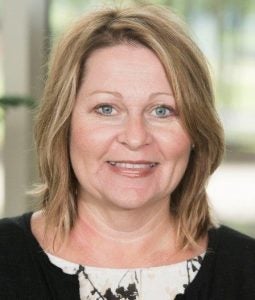Grant continues faculty partnership with Wilson middle school
An East Carolina University associate professor will examine the outcomes of emotional poverty training on teachers practice in Wilson thanks to funding from a grant from the Engagement Scholarship Consortium.

East Carolina University College of Nursing assistant professor Dr. Deborah Tyndall received a grant from the Engagement Scholarship Consortium to continue her community engaged research project with Wilson County Schools. (Contributed photo)
The $5,000 ESC Engaged Scholarship Research/Creative Activities Grant awarded to the College of Nursing’s Dr. Deborah Tyndall continues a partnership with Wilson County Schools that began in 2013.
The study will examine outcomes of emotional poverty training on teacher practice to study its effect on student perspectives of school connectedness and attitudes on seeking help.
Defined as the belief by students that adults and peers in their school care about them and their learning, school connectedness has been found to have the potential to offset risk factors that lead to negative student educational and mental health outcomes, Tyndall said.
Tyndall’s project will include focus groups with teachers to explore their use of school connectedness strategies, and both surveys and focus groups with students to learn more about their attitudes toward school connectedness and their willingness to seek help from school staff.
“We anticipate that this project will allow us to compare perceptions between teachers and students regarding school connectedness,” Tyndall said. “These findings will be critical in identifying appropriate interventions to improve school connectedness at Toisnot Middle School.”
Developed by educator Dr. Ruby Payne, emotional poverty workshops have been used by thousands to better recognize when students’ disruptive behaviors in the classroom may be due to mental health or emotional needs.
Emotional poverty can occur in all demographics, but students at low-income schools may be more at risk. Toisnot is a Title 1 school in which 72% of students are considered economically disadvantaged. In-school suspension rates reach seven times higher than the state average, Tyndall said.
Tyndall partnered with Toisnot in 2019 and led an Engagement and Outreach Scholars Academy project that involved the school. After attending support service team meetings at the school, Toisnot leadership worked with Tyndall to find priority areas that her research could address, including teacher attentiveness and responsiveness to their students’ emotional states.
“Focusing on community engagement has made me think outside of my researcher bubble and be more considerate of what is important to our community,” Tyndall said. “It’s been a rewarding experience to give back to my community. In the eight years I have partnered with Wilson County Schools, I have gained a whole new level of respect for the work that school leaders and teachers do for students.”
Tyndall plans to begin the next phase of her project with a presentation to teachers and staff at the school this month.
In addition to Tyndall, the partnership has included participation from several ECU students, including College of Nursing doctoral candidates and EC Scholars as part of the EOSA program.
“This partnership is an excellent example of how a university and a community partner can work together to connect student learning in classrooms with practical experience,” said Sharon Paynter, ECU assistant vice chancellor for economic and community engagement and ESC board member. “It brings together the knowledge and skills of the partners in a way that creates value for the community and university and national recognition for the work highlights its importance.”
The ESC is composed of higher education institutions that work to build strong university-community partnerships. The consortium includes 41 universities from across the country, including the University of Alabama, Michigan State University, Virginia Tech and Ohio State University.
ECU and its partners have received past honors from the ESC, including for work in agricultural health and safety and high school athletics safety reform.